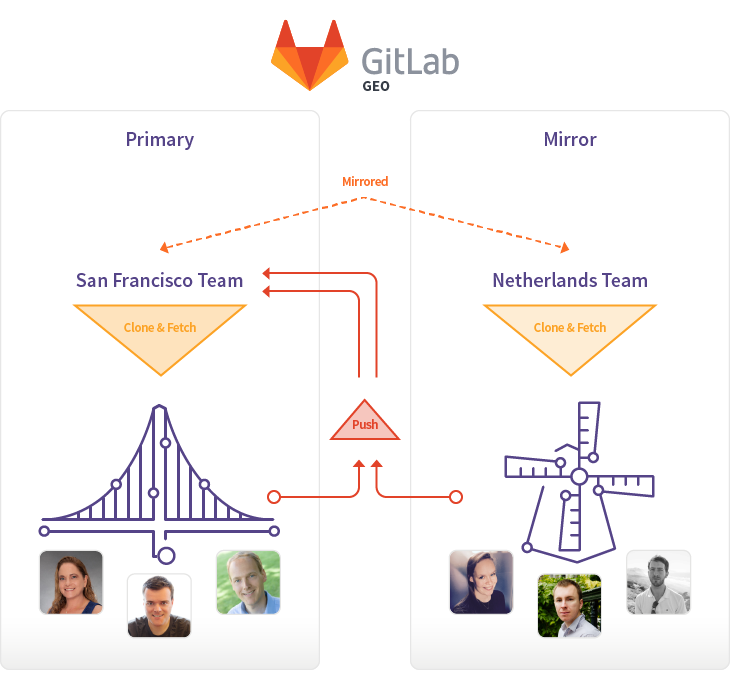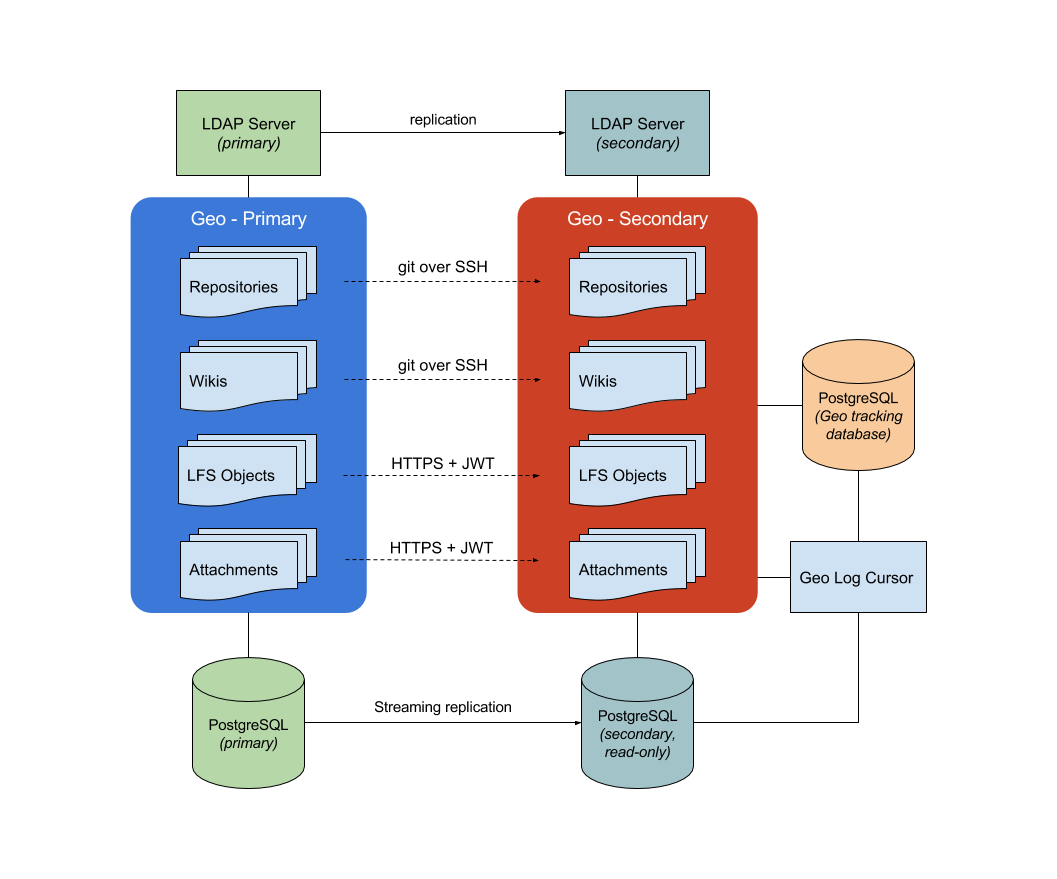GitLab Geo
Note: GitLab Geo is in Beta development. It is considered experimental and not production-ready. It will undergo significant changes over the next year, and there is significant chance of data loss. For the latest updates, check the meta issue.
Notes:
- GitLab Geo is part of GitLab Enterprise Edition Premium.
- Introduced in GitLab Enterprise Edition 8.9. We recommend you use it with at least GitLab Enterprise Edition 10.0 for basic Geo features, or latest version for a better experience.
- You should make sure that all nodes run the same GitLab version.
GitLab Geo allows you to replicate your GitLab instance to other geographical locations as a read-only fully operational version.
Overview
If you have two or more teams geographically spread out, but your GitLab instance is in a single location, fetching large repositories can take a long time.
Your Geo instance can be used for cloning and fetching projects, in addition to reading any data. This will make working with large repositories over large distances much faster.
When Geo is enabled, we refer to your original instance as a primary node and the replicated read-only ones as secondaries.
Keep in mind that:
- Secondaries talk to primary to get user data for logins (API), to clone/pull from repositories (SSH) and to retrieve LFS Objects and Attachments (HTTPS + JWT).
- Since GitLab Enterprise Edition Premium 10.0, the primary no longer talks to secondaries to notify for changes (API).
Use-cases
- Can be used for cloning and fetching projects, in addition to reading any data available in the GitLab web interface
- Overcomes slow connection between distant offices, saving time by improving speed for distributed teams
- Helps reducing the loading time for automated tasks, custom integrations and internal workflows
Architecture
The following diagram illustrates the underlying architecture of GitLab Geo:
In this diagram, there is one Geo primary node and one secondary. The secondary clones repositories via git over SSH. Attachments, LFS objects, and other files are downloaded via HTTPS using the GitLab API to authenticate, with a special endpoint protected by JWT.
Writes to the database and Git repositories can only be performed on the Geo primary node. The secondary node receives database updates via PostgreSQL streaming replication.
Note that the secondary needs two different PostgreSQL databases: a read-only instance that streams data from the main GitLab database and another used internally by the secondary node to record what data has been replicated.
In the secondary nodes there is an additional daemon: Geo Log Cursor.
Geo Requirements
We highly recommend that you install Geo on an operating system that supports OpenSSH 6.9 or higher. The following operating systems are known to ship with a current version of OpenSSH:
* CentOS 7.4
* Ubuntu 16.04Note that CentOS 6 and 7.0 ship with an old version of OpenSSH that do not support a feature that Geo requires. See the documentation on GitLab Geo SSH access for more details.
LDAP
We recommend that if you use LDAP on your primary that you also set up a secondary LDAP server for the secondary Geo node. Otherwise, users will not be able to perform Git operations over HTTP(s) on the secondary Geo node using HTTP Basic Authentication. However, Git via SSH and personal access tokens will still work.
Check with your LDAP provider for instructions on on how to set up replication. For example, OpenLDAP provides these instructions.
Geo Tracking Database
We use the tracking database as metadata to control what needs to be updated on the disk of the local instance (for example, download new assets, fetch new LFS Objects or fetch changes from a repository that has recently been updated).
Because the replicated instance is read-only, we need this additional instance per secondary location.
Geo Log Cursor
This daemon reads a log of events replicated by the primary node to the secondary database and updates the Geo Tracking Database with changes that need to be executed.
When something is marked to be updated in the tracking database, asynchronous jobs running on the secondary node will execute the required operations and update the state.
This new architecture allows us to be resilient to connectivity issues between the nodes. It doesn't matter if it was just a few minutes or days. The secondary instance will be able to replay all the events in the correct order and get in sync again.
Setup instructions
In order to set up one or more GitLab Geo instances, follow the steps below in the exact order they appear. Make sure the GitLab version is the same on all nodes.
Using Omnibus GitLab
If you installed GitLab using the Omnibus packages (highly recommended):
- Install GitLab Enterprise Edition on the server that will serve as the secondary Geo node. Do not login or set up anything else in the secondary node for the moment.
- Upload the GitLab License to the primary Geo Node to unlock GitLab Geo.
-
Setup the database replication (
primary (read-write) <-> secondary (read-only)topology). - Configure SSH authorizations to use the database
- Configure GitLab to set the primary and secondary nodes.
- Optional: Configure a secondary LDAP server for the secondary. See notes on LDAP.
- Follow the after setup steps.
Using GitLab installed from source
If you installed GitLab from source:
- Install GitLab Enterprise Edition on the server that will serve as the secondary Geo node. Do not login or set up anything else in the secondary node for the moment.
- Upload the GitLab License you purchased for GitLab Enterprise Edition to unlock GitLab Geo.
-
Setup the database replication (
primary (read-write) <-> secondary (read-only)topology). - Configure SSH authorizations to use the database
- Configure GitLab to set the primary and secondary nodes.
- Follow the after setup steps.
Configuring GitLab Geo
Read through the GitLab Geo configuration documentation.
Updating the Geo nodes
Read how to update your Geo nodes to the latest GitLab version.
Current limitations
- You cannot push code to secondary nodes
- Primary node has to be online for OAuth login to happen (existing sessions and git are not affected)
Frequently Asked Questions
Read more in the Geo FAQ.
Log files
Since GitLab 9.5, Geo stores structured log messages in a geo.log file. For
Omnibus installations, this file can be found in
/var/log/gitlab/gitlab-rails/geo.log. This file contains information about
when Geo attempts to sync repositories and files. Each line in the file contains a
separate JSON entry that can be ingested into Elasticsearch, Splunk, etc. For
example:
{"severity":"INFO","time":"2017-08-06T05:40:16.104Z","message":"Repository update","project_id":1,"source":"repository","resync_repository":true,"resync_wiki":true,"class":"Gitlab::Geo::LogCursor::Daemon","cursor_delay_s":0.038}This message shows that Geo detected that a repository update was needed for project 1.
Troubleshooting
Read the troubleshooting document.

